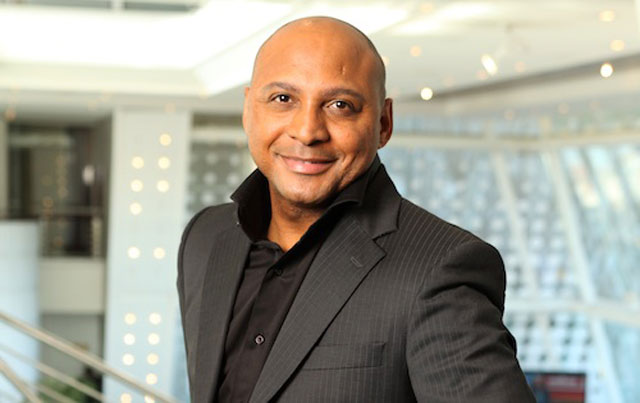
Former top Vodacom executive Romeo Kumalo plans to launch a mobile virtual network operator in South Africa. The former CEO of Vodacom’s international operations is, however, tight-lipped about what the MVNO will entail and who he’s partnering with to launch it.
Kumalo, who quit Vodacom in mid-2015, has co-founded a venture capital firm called Washirika Holdings with former Absa marketing director and SuperSport CEO Happy Ntshingila and two other partners to invest in the ICT and clean energy sectors.
Though he declined to provide further details about the planned MVNO, including when it will be launched, he described it as a “massive” project that has consumed much of his focus since he resigned from Vodacom. It will continue to be the project that takes up most of his time, he said.
In his first media interview since quitting Vodacom, Kumalo told TechCentral that he believed he had hit a ceiling at the mobile operator, at least in the short to medium term. And he had become enamoured of the idea of striking out on this own. “My ambition has always to be the CEO of a big telco,” he said. “I was hoping to be CEO [of Vodacom] at some stage. But Shameel [Joosub, Vodacom’s current CEO,] is young and he’s doing extremely well.”
Kumalo, who will star in M-Net’s upcoming show Shark Tank, first realised he wanted to quit the corporate world in 2012, when Vodacom sent him to Harvard Business School in the US to complete the university’s renowned Advanced Management Programme. While at Harvard, he was exposed to a wide range of “inspirational entrepreneurs”, including many people from Silicon Valley, he said. It changed his view of what he wanted to do with his life.
“In 2012, I took the decision to leave [Vodacom], but I didn’t have the balls to do it then. I realised I didn’t want to be in corporate anymore, though. I wanted to be an entrepreneur.”
But when he returned to Vodacom, he spent another three years with the group, first as chief commercial officer and later as head of international operations, which he said was a “fascinating” but highly demanding and complicated role that meant extensive travelling and dealing not only with the commercial operations but also managing government relations and actively pursuing opportunities in new markets. “I lived out of a suitcase.”
Kumalo, who spent more than a decade at Vodacom, had originally been recruited by former CEO Alan Knott-Craig to start a television network. At the time, he was heading up SABC television. “My plan at the time was to join Naspers, but Alan said I’d be doing the same thing at Vodacom [as at Naspers] and he convinced me to join.”
Ironically, Vodacom never did launch a TV network, choosing instead to partner with MultiChoice, which is owned by Naspers, to launch new DStv bouquets aimed at the mobile operator’s customers.
With the TV project scrapped, Kumalo was offered the job of running Vodacom’s then-nascent Tanzanian business, which eventually – through other senior group positions – led him into the role of CEO of international operations.
Through Washirika, Kumalo is keen to get back into the telecommunications industry – but on his own terms. “We are starting a major telco business, buying assets from an existing business,” he said, declining to name the company or provide more details until a formal announcement is made.
In the ICT space, the plan is for Washirika to invest in early-stage businesses and help them to scale by working with them on strategy, and providing processes and systems to support their growth.
In green energy, Washirika is already involved in a project with the developers of the expansive Waterfall estate north of Johannesburg, where it is installing a “major” solar-powered energy system. And, together with other investors, it is involved in a 200MW concentrated solar project in the Northern Cape. — © 2016 NewsCentral Media




